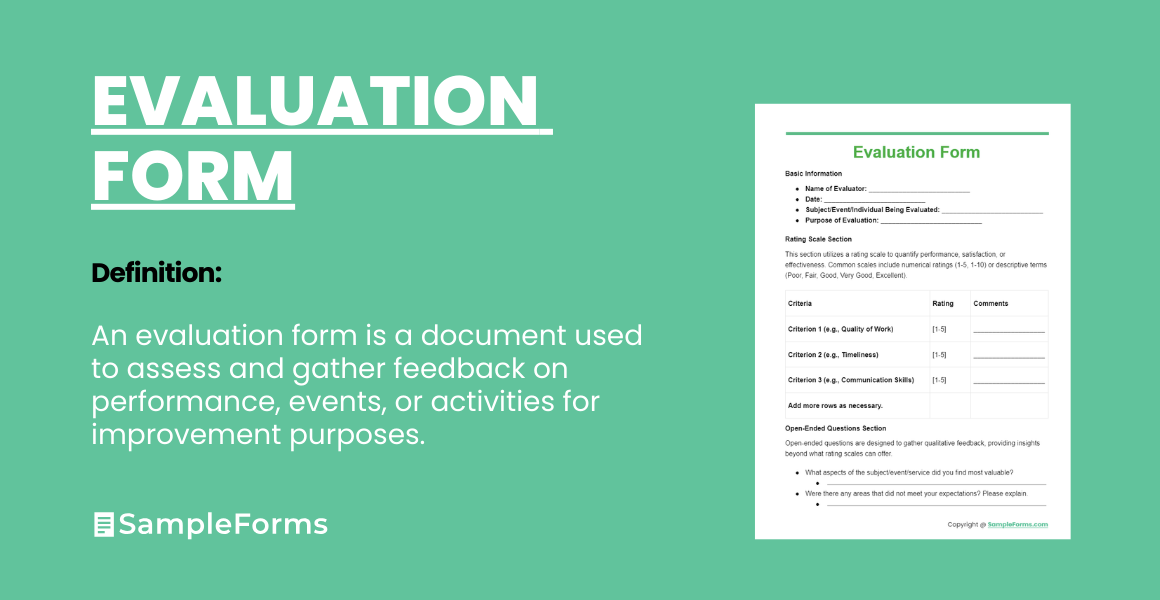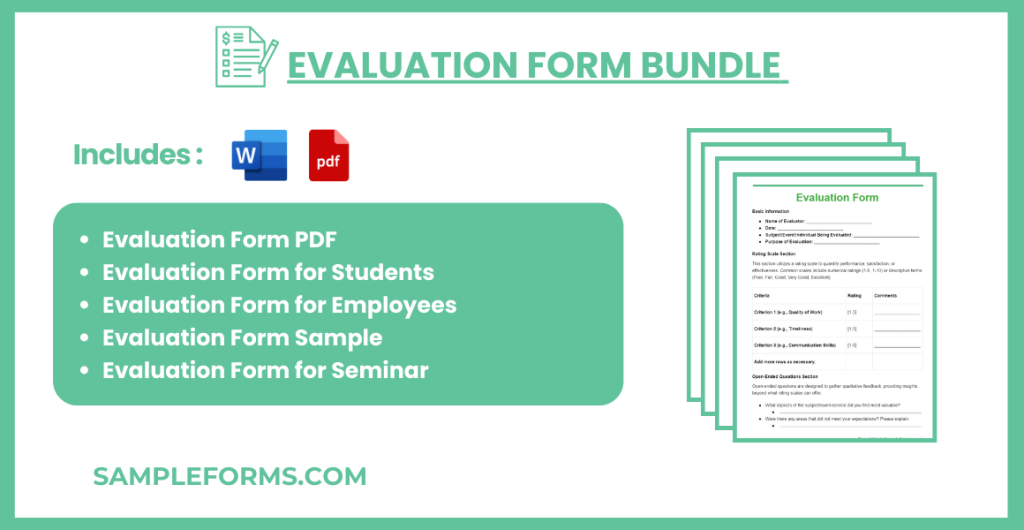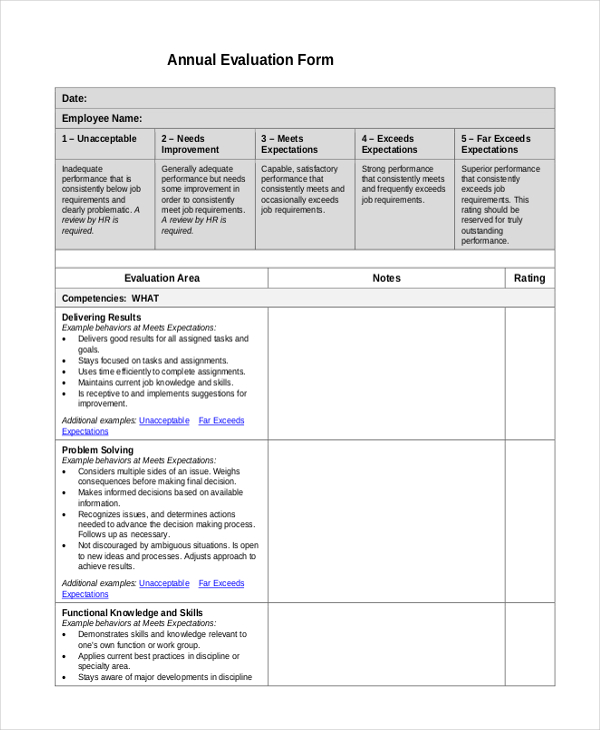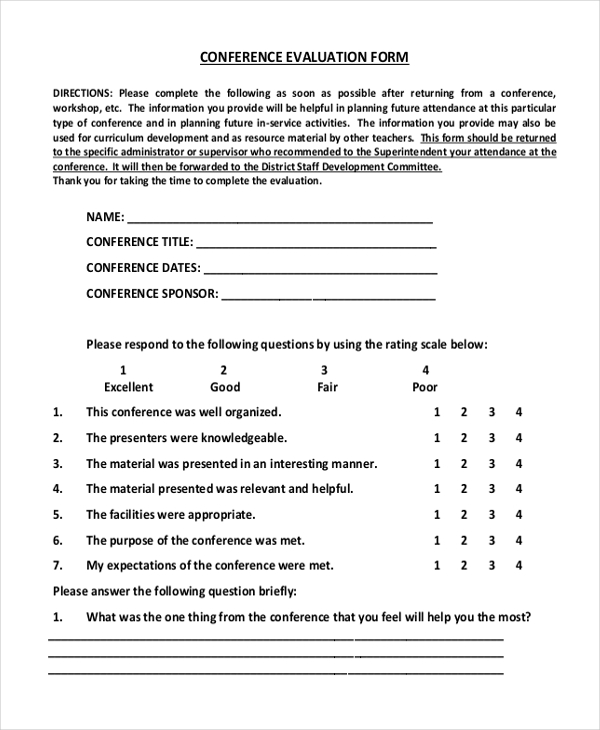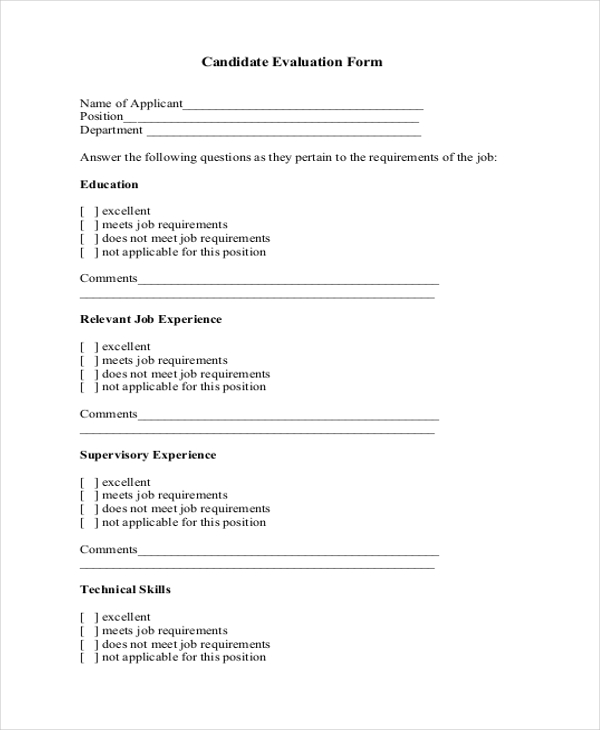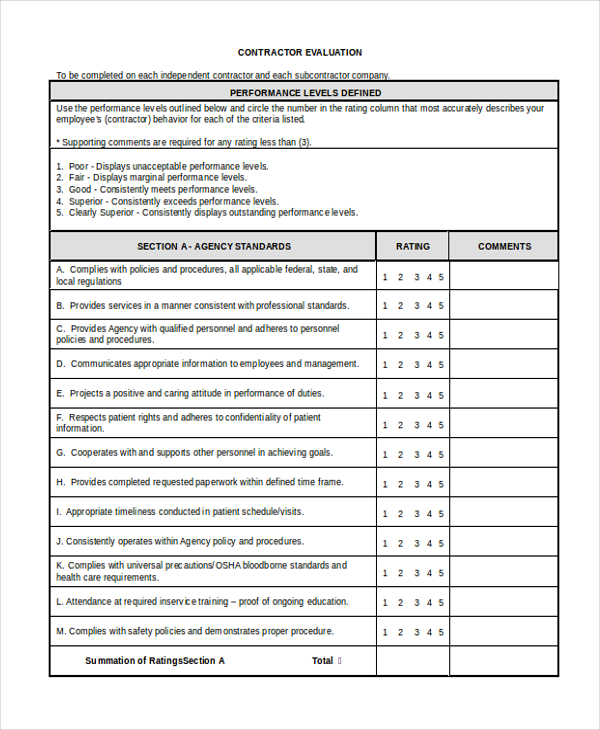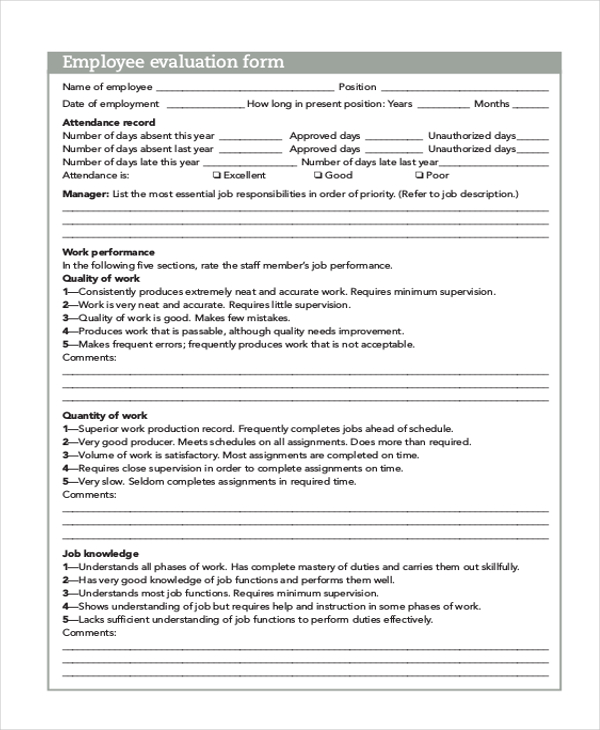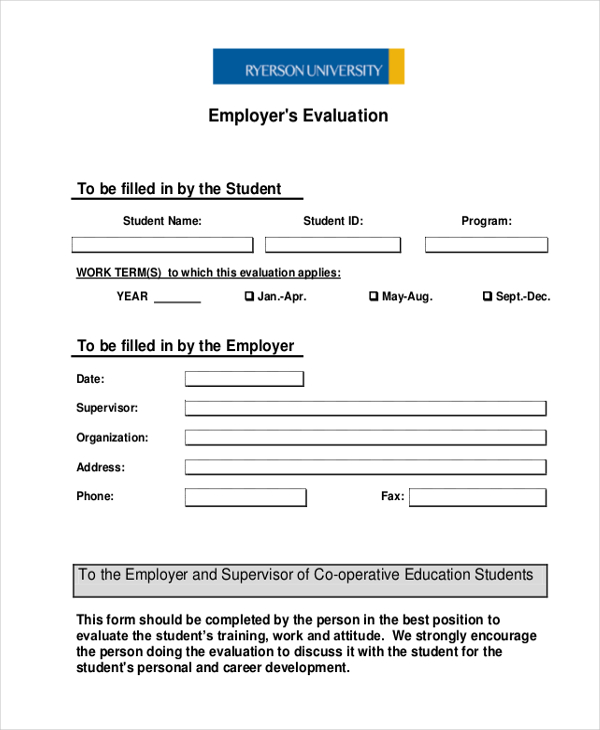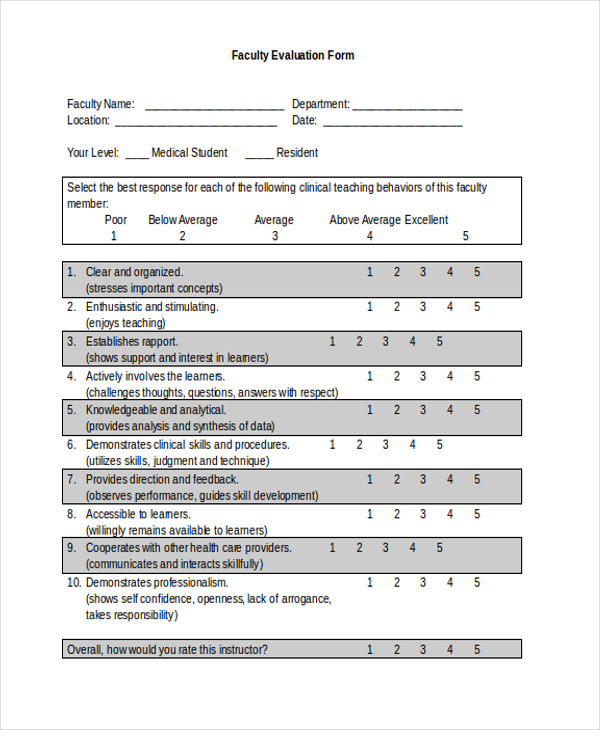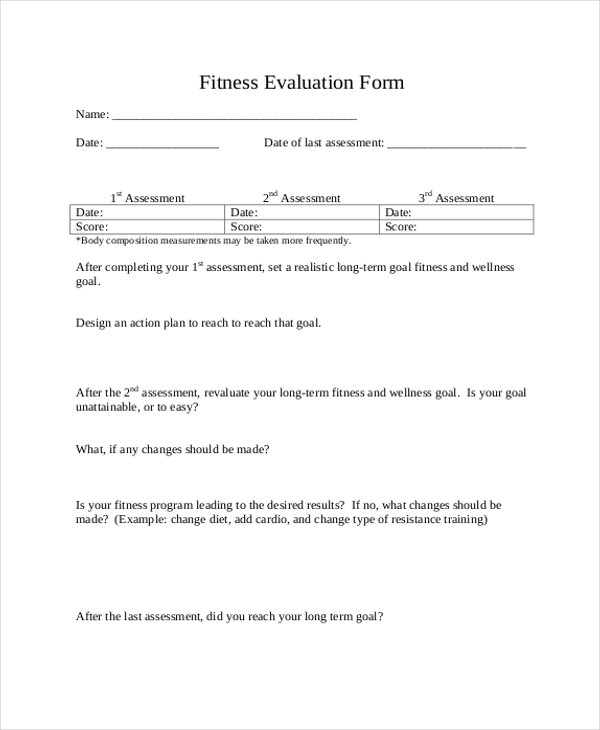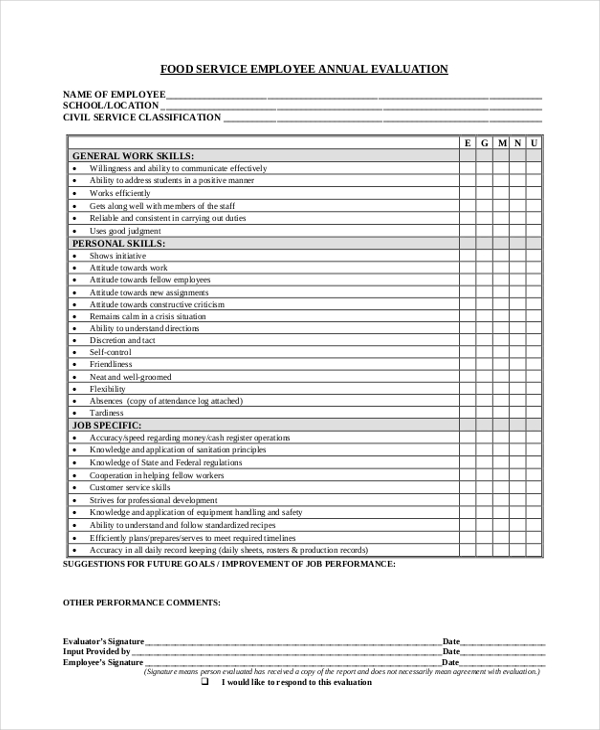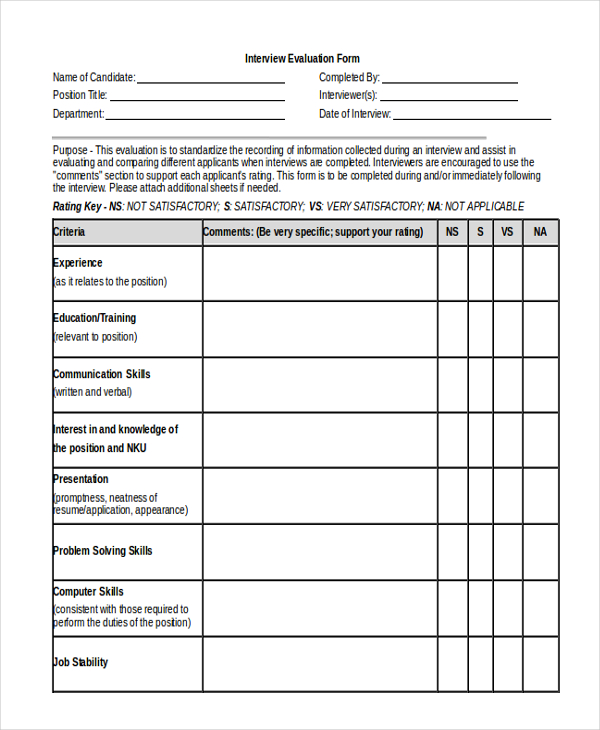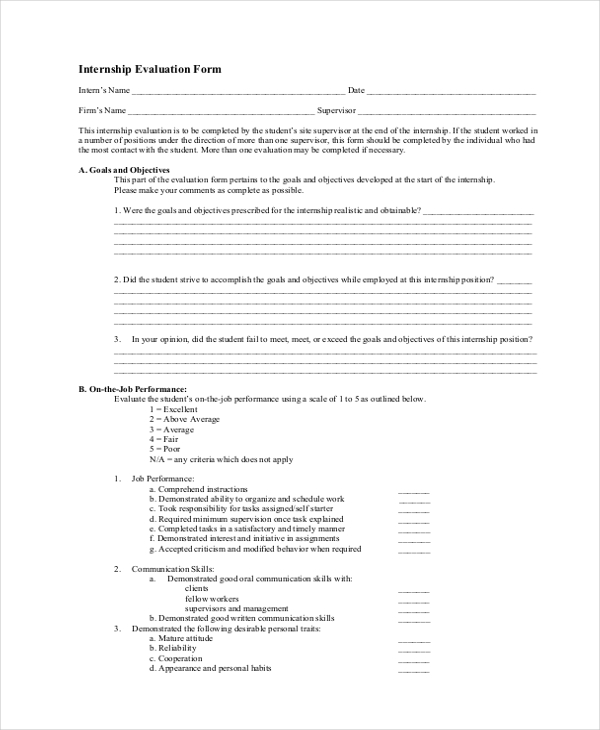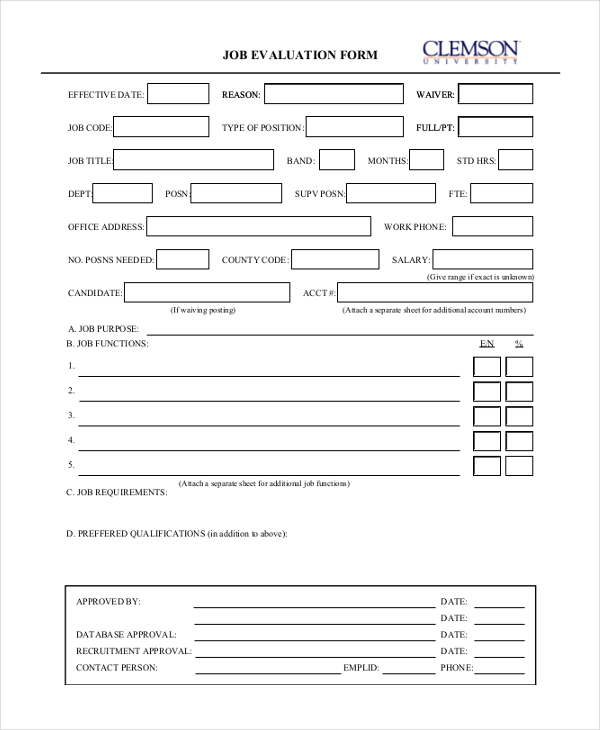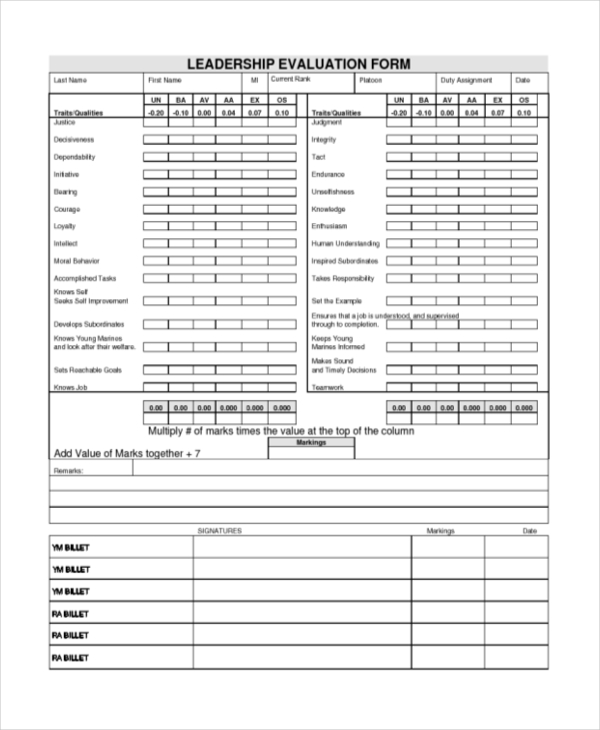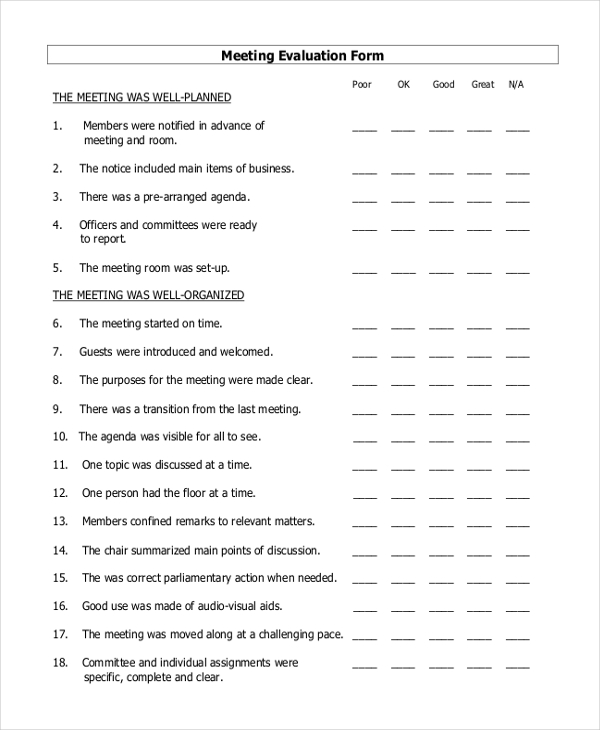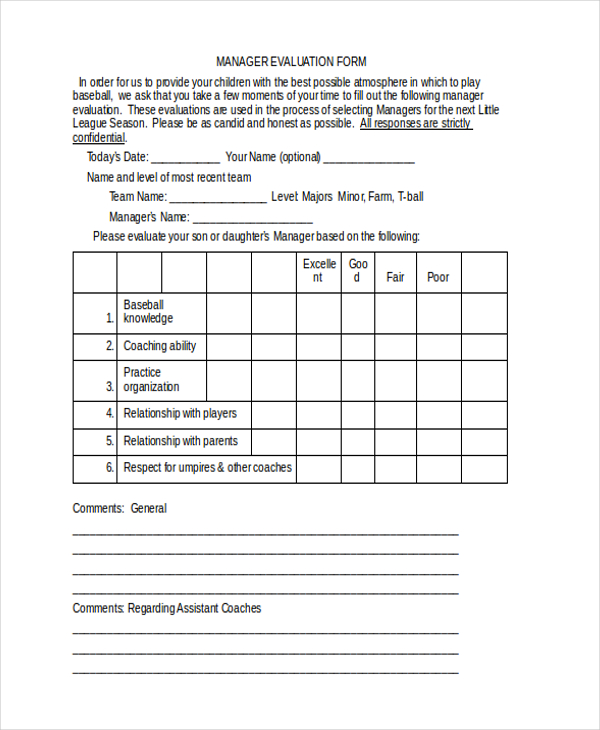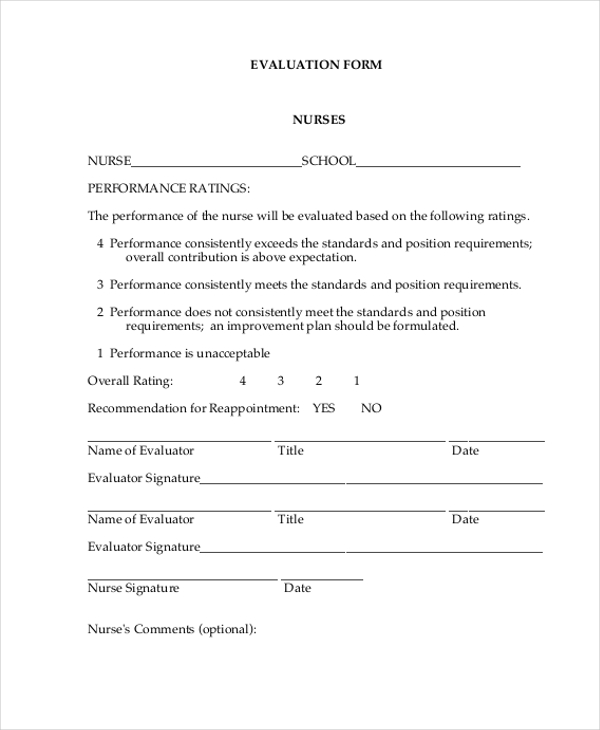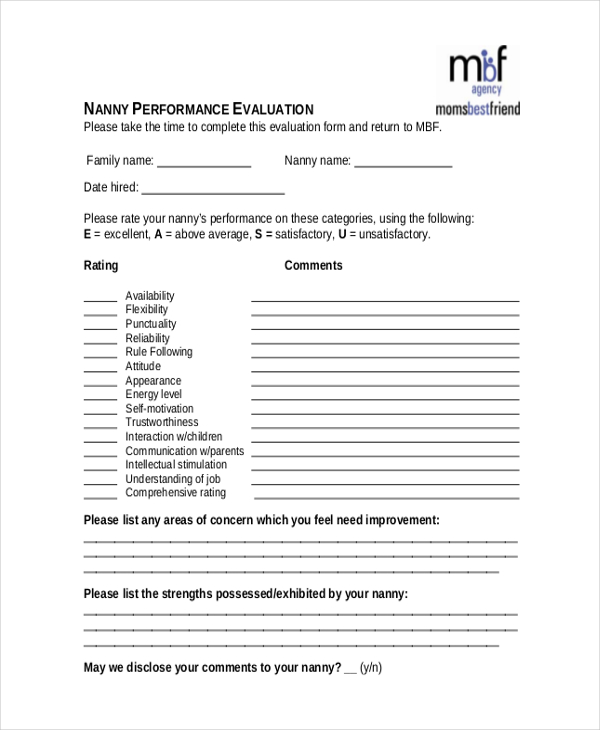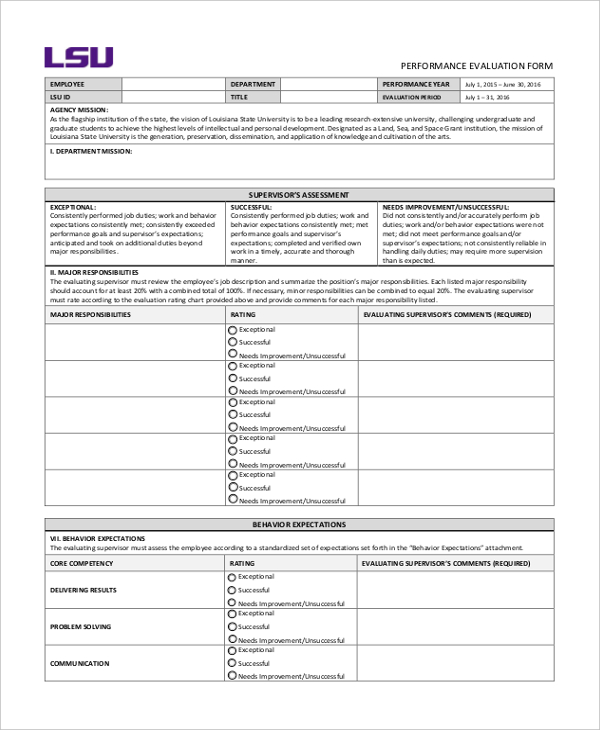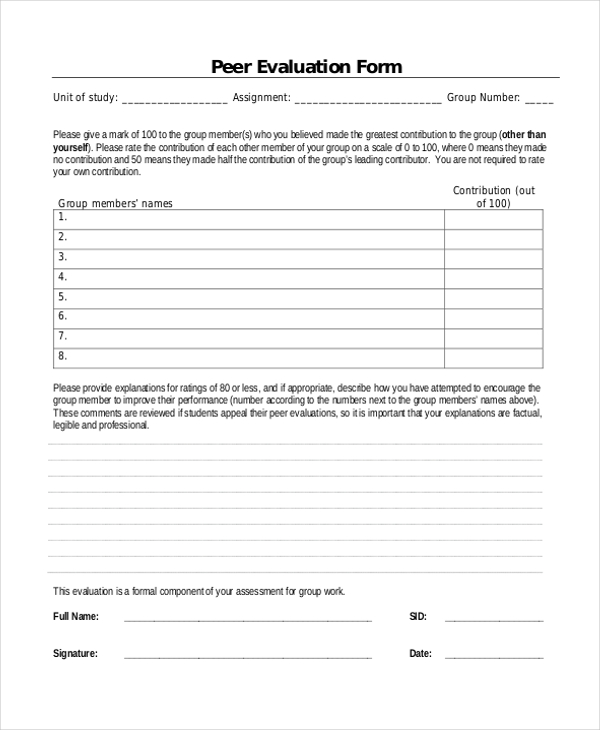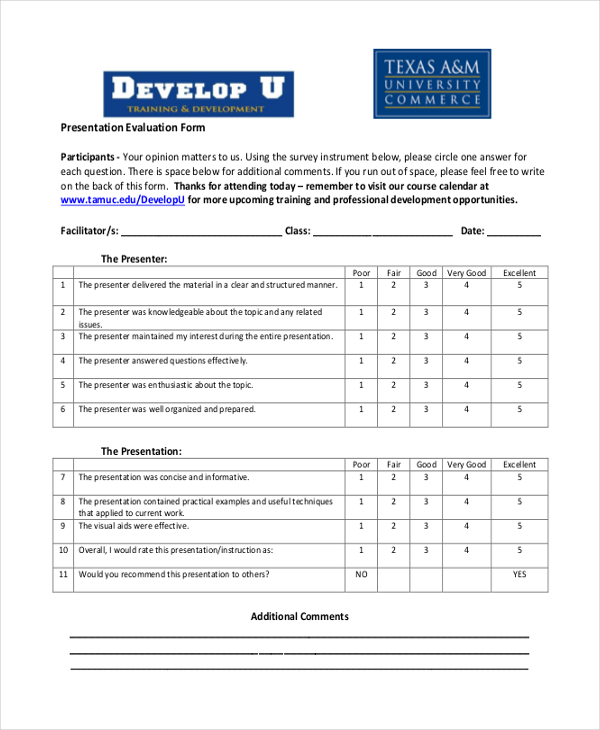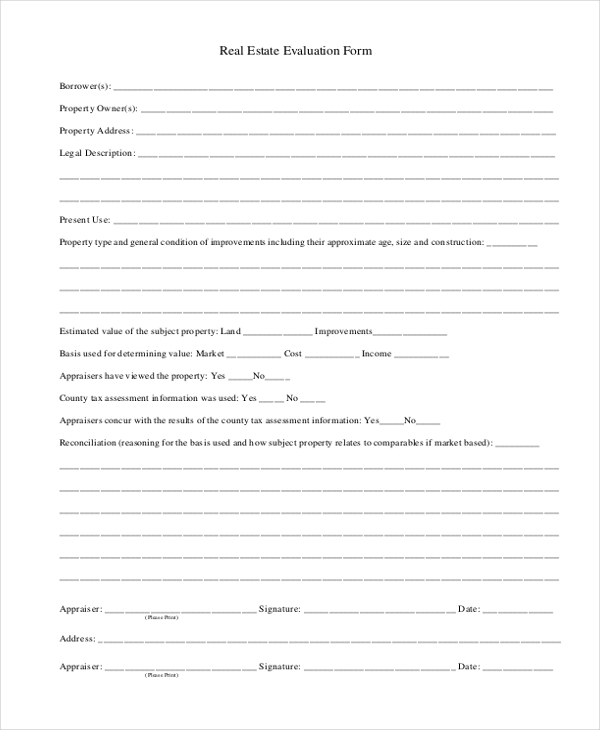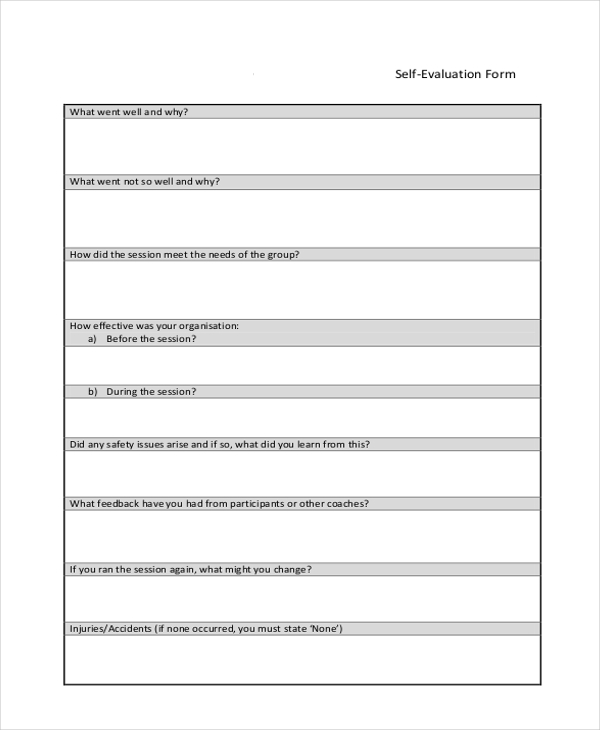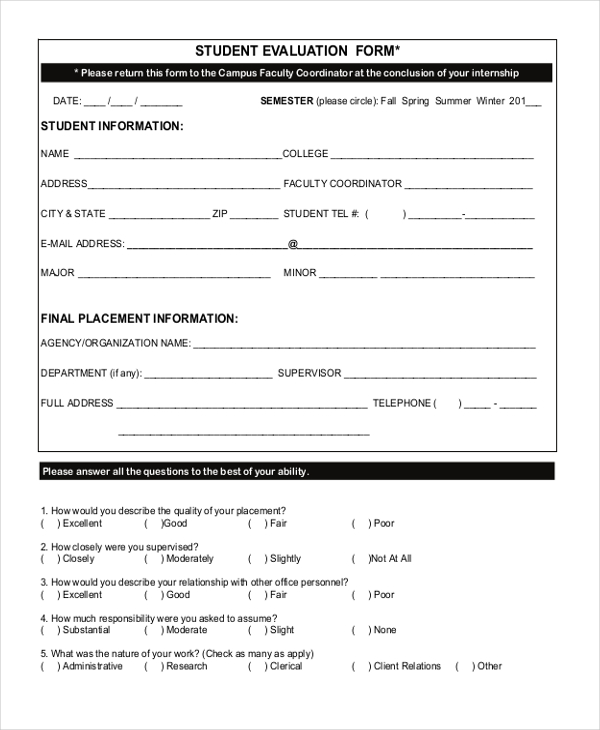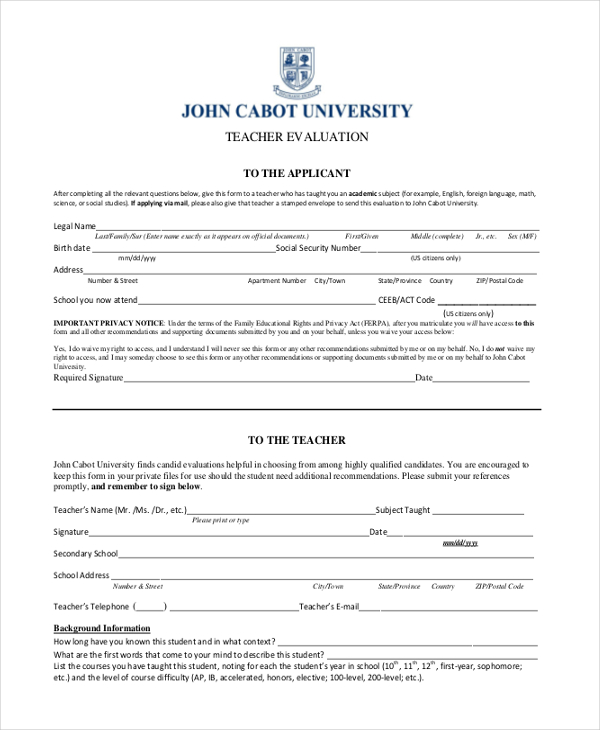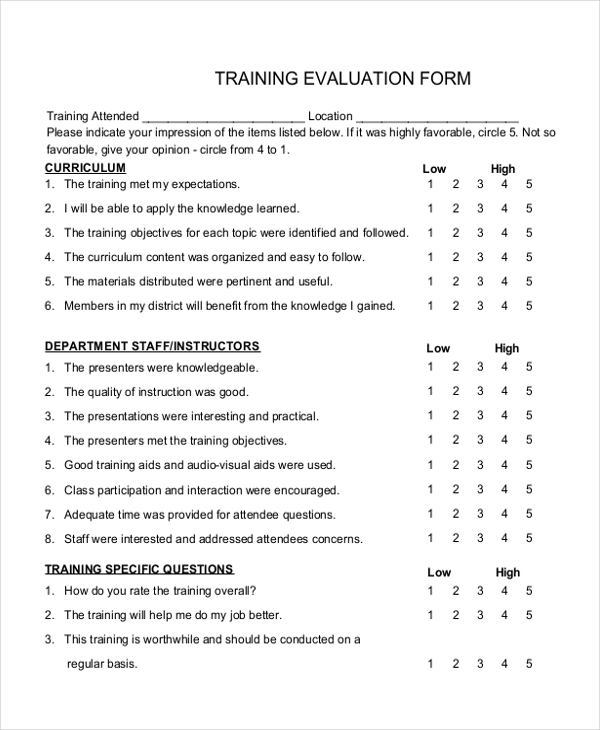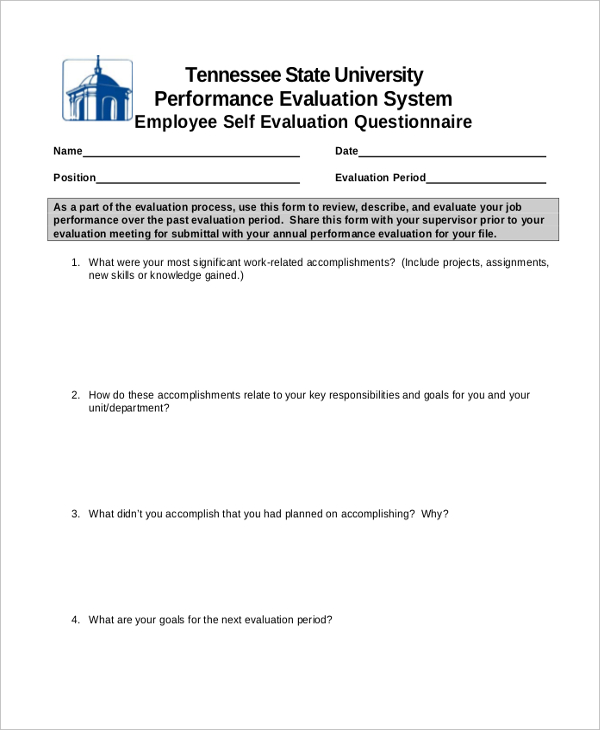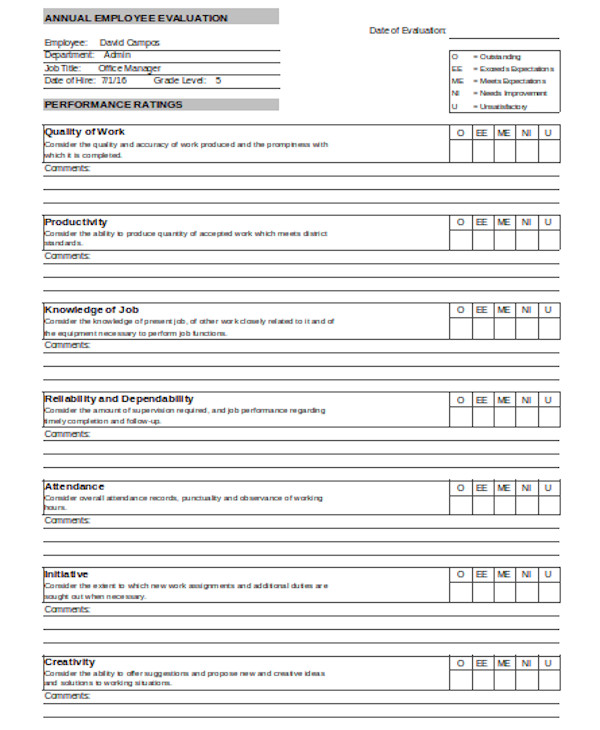Dive into our comprehensive guide on Evaluation Forms, featuring insightful examples that span from Fillable Forms to Employee Evaluation Form Words. This guide is crafted to enlighten you on creating, utilizing, and maximizing the benefits of evaluation forms in various contexts. Whether for training feedback, employee performance reviews, or self-assessments, our guide provides essential tips, best practices, and key considerations to ensure effective and meaningful evaluations.
Download Evaluation Form bundle
What is an Evaluation Form?
An Evaluation Form is a tool designed to assess and review performance, skills, knowledge, or satisfaction in various settings. These forms can range from Training Evaluation Forms, which gauge the effectiveness of educational sessions, to Employee Evaluation Forms that monitor and guide job performance. Essential for gathering feedback, evaluation forms help in making informed decisions, enhancing programs, and fostering growth and development within organizations.
What is the Best Sample Evaluation Form?
Evaluation Form
1. General Information
- Name of Evaluator: _______________________
- Date: _______________
- Subject of Evaluation (Event/Service/Individual): _______________________
2. Evaluation Criteria
- Quality of Service/Performance:
- Excellent [ ] Good [ ] Average [ ] Poor [ ] Very Poor
- Comments: ______________________________________________________
- Efficiency and Timeliness:
- Excellent [ ] Good [ ] Average [ ] Poor [ ] Very Poor
- Comments: ______________________________________________________
- Professionalism:
- Excellent [ ] Good [ ] Average [ ] Poor [ ] Very Poor
- Comments: ______________________________________________________
- Overall Satisfaction:
- Very Satisfied [ ] Satisfied [ ] Neutral [ ] Unsatisfied [ ] Very Unsatisfied
- Comments: ______________________________________________________
3. Additional Feedback
- Please provide any additional comments or suggestions for improvement:
4. Conclusion
- Would you recommend this service/event/individual to others?
- Yes [ ] No
- If no, please explain: _____________________________________________
This form can be adapted to suit various evaluation needs, ensuring that it captures all relevant feedback in a structured and easy-to-analyze format.
Employee Evaluation Form Format
Employee Information
- Employee Name: [Text Field]
- Position: [Text Field]
- Department: [Text Field]
- Evaluation Date: [Date Picker]
- Evaluator: [Text Field]
Evaluation Criteria
- Work Quality: [Rating Scale: 1-5] | Comments: [Text Area]
- Productivity: [Rating Scale: 1-5] | Comments: [Text Area]
- Job Knowledge: [Rating Scale: 1-5] | Comments: [Text Area]
- Reliability: [Rating Scale: 1-5] | Comments: [Text Area]
- Communication: [Rating Scale: 1-5] | Comments: [Text Area]
- Teamwork: [Rating Scale: 1-5] | Comments: [Text Area]
- Initiative: [Rating Scale: 1-5] | Comments: [Text Area]
- Problem-Solving: [Rating Scale: 1-5] | Comments: [Text Area]
Overall Performance
- Overall Rating: [Rating Scale: 1-5]
- Summary Comments: [Text Area]
Goals for Next Period
- Performance Goals: [Text Area]
- Development Goals: [Text Area]
Employee Feedback
- Employee Comments: [Text Area]
Signatures
- Evaluator Signature: [Text Field] | Date: [Date Picker]
- Employee Signature: [Text Field] | Date: [Date Picker]
Evaluation Form PDF, Word and Google Docs
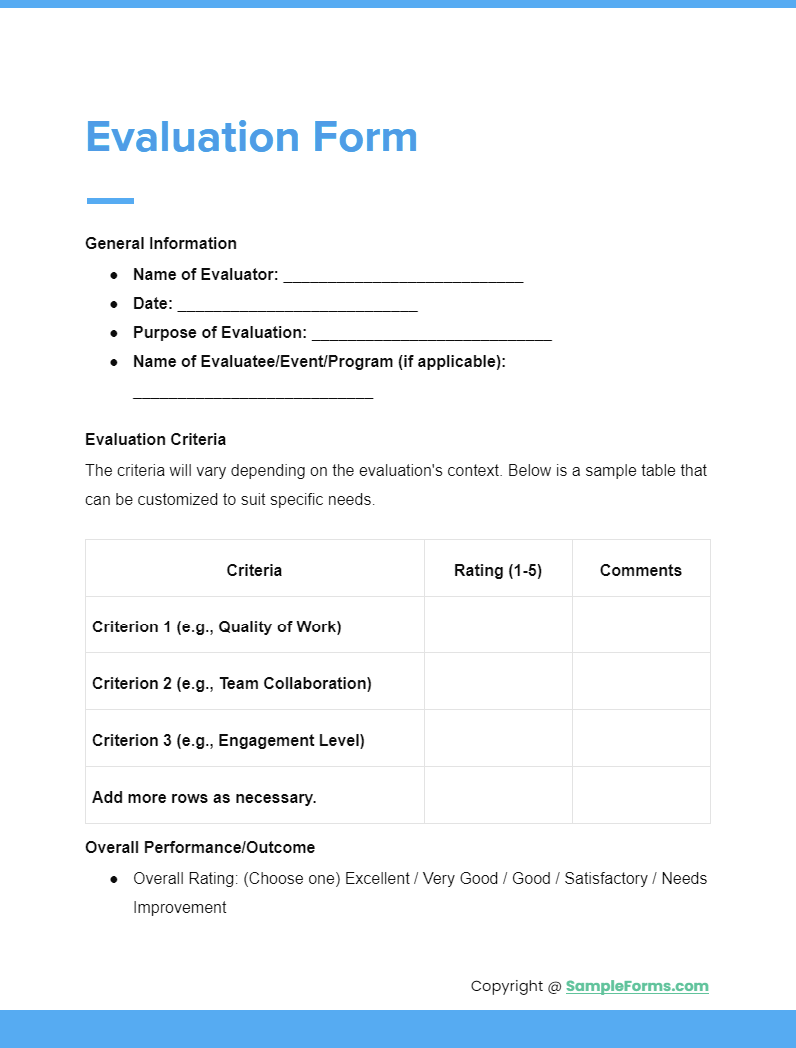
Incorporate an Employee Self Evaluation Form and Training Evaluation Form into your toolkit to empower individuals and teams, enhancing self-awareness and training outcomes through structured feedback and actionable insights.
Student Evaluation Form
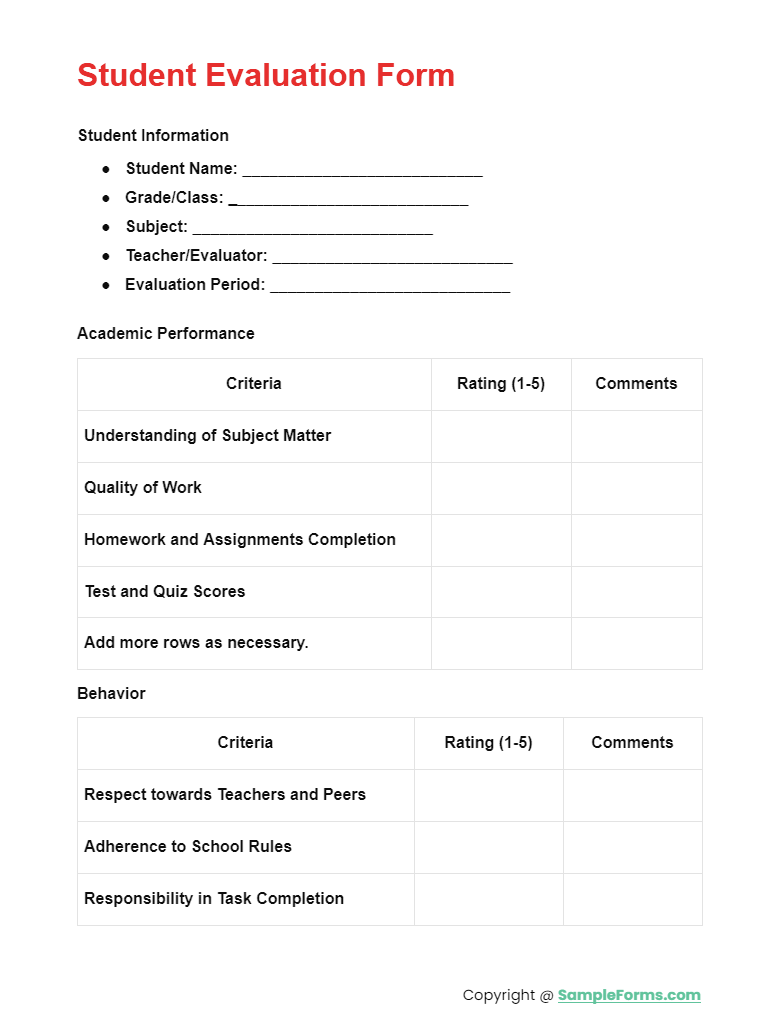
Leverage the Call Monitoring Evaluation Form and Peer Evaluation Form to foster a comprehensive educational environment. These tools encourage constructive feedback and peer-to-peer learning, essential for student development.
Evaluation Form for Employees
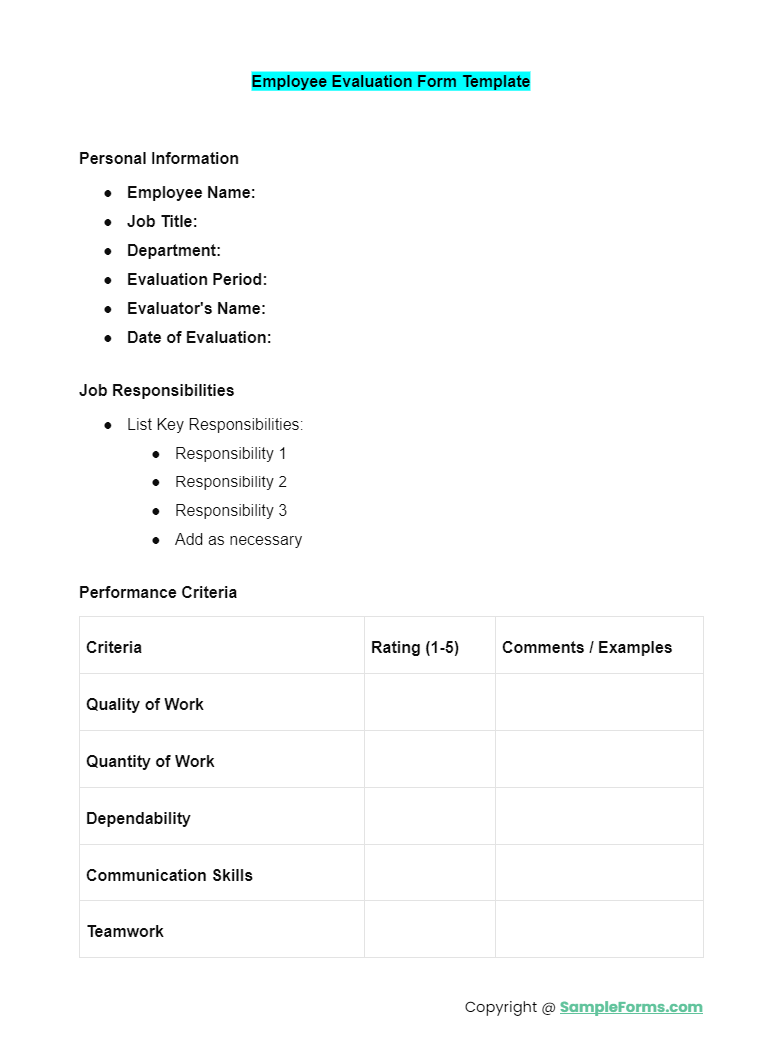
Utilize an Interview Evaluation Form and Employee Performance Evaluation Form to streamline the hiring process and ongoing performance assessments. These forms provide a structured approach to evaluating potential hires and existing staff.
Evaluation Form Sample
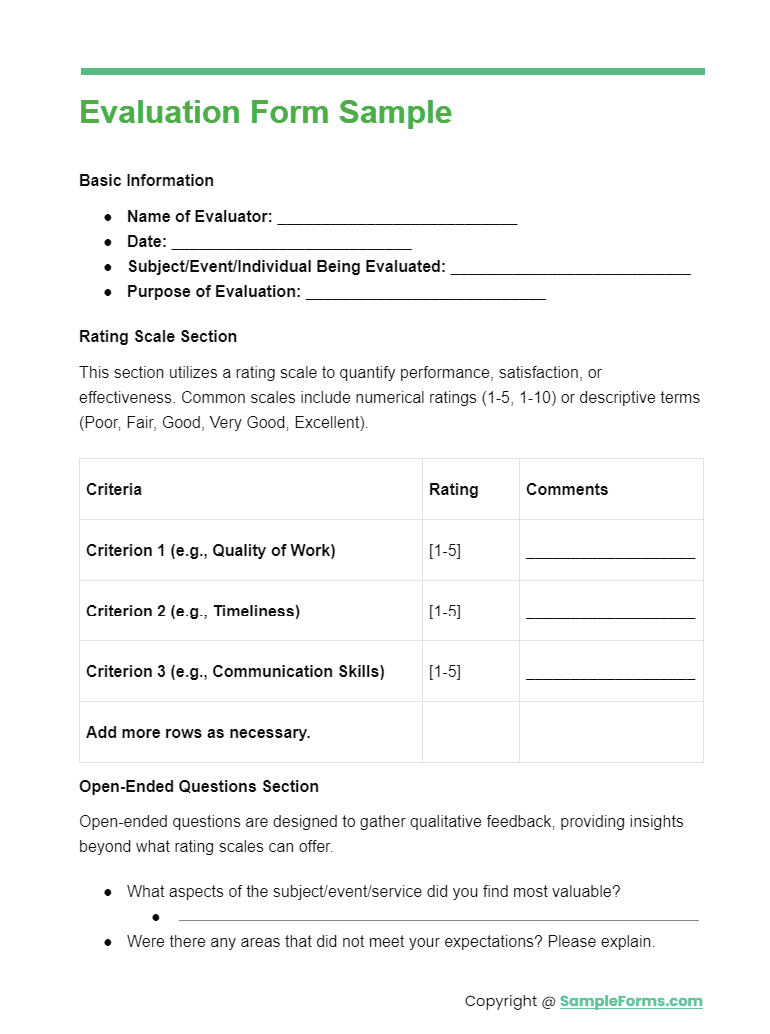
An Internship Evaluation Form and Debate Evaluation Form serve as prime examples of how targeted feedback mechanisms can significantly impact learning experiences and skill development in specific contexts.
Evaluation Form for Seminar
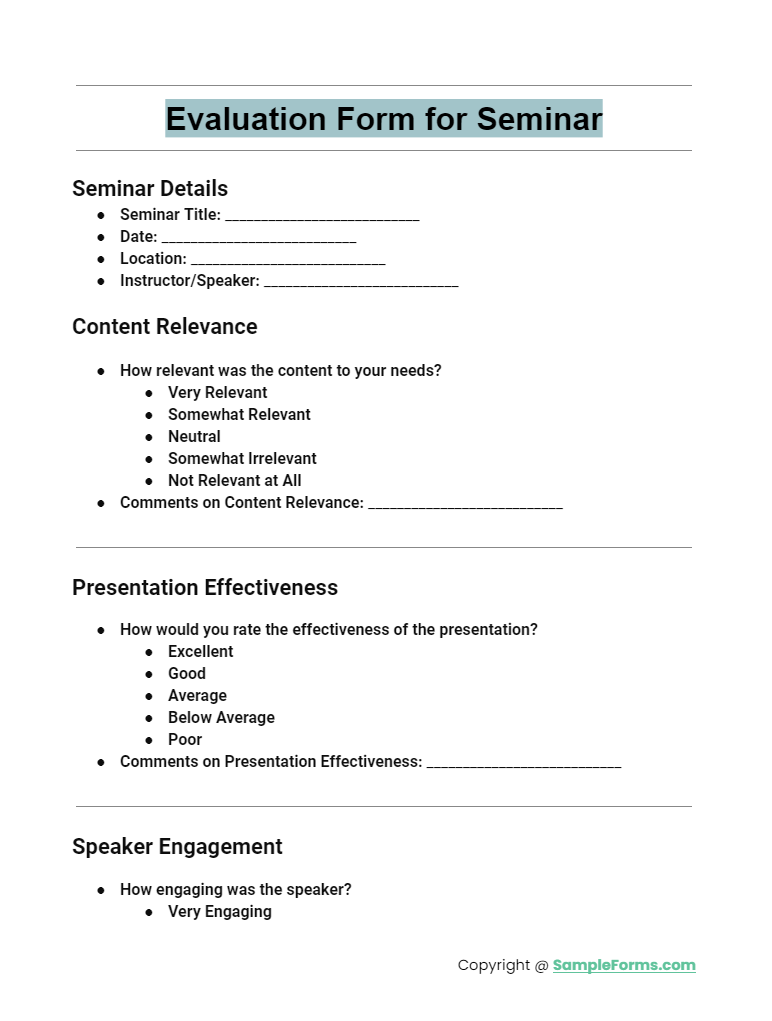
More Evaluation Form Samples
Annual Evaluation Form
As might be evident from the name, this best form is used by an employer or a business organization to evaluate the performance of its employees during the year. It can also be used to evaluate the performance of the company in a financial year.
Conference Evaluation Form
This form is used by the organizers of a conference to understand what the participants think of the conference. The result helps them to analyze what improvements they need to make. You also browse our General Evaluation Forms.
Candidate Evaluation Form
Contractor Evaluation Form
A contractor who might have offered his services to a client. He hands over this form to him and urges him to fill it up. The details filled in by client gives the contractor an idea about how he can improve his services.
Employee Evaluation Form
An employer or higher official in an organization uses this employee review forms template to evaluate the performance and other traits of an employee. This, in turn, helps the company to come up with plans to help in the employee’s development.
Employer Evaluation Form
Whenever a student joins a company for a summer job or to gain a short term experience, he needs to get this form filled by the employer. The person is required to evaluate the performance of the student during the given period.
Faculty Evaluation Form
This form is used by educational institutions to gauge the performance of their faculty. The students are the ones who are expected to fill in this form which in turn helps the authorities to take necessary measures in improving the faculty.
Fitness Evaluation Form
A fitness club or a fitness instructor uses a fitness evaluation form to assess its patrons fitness over a period of time. The form helps the person to evaluate its patrons against certain parameters.
Food Evaluation Form
This form is usually used by caterers, restaurants and canteen services to find out what their patrons or customers think about the food. The person concerned is required to answer certain questions which in turn simplify the evaluation process. You should also take a look at our Annual Evaluation Forms.
Interview Evaluation Form
An interviewer or hiring agency uses an interview evaluation form to assess and evaluate a candidate. The form contains some questions which the interviewer needs to answer. These will help the hiring team to take an informed decision.
Internship Evaluation Form
Whenever a person joins a firm for an internship, he gets this form filled by the employer or his boss at the end of the internship term. The form evaluates the performance of the person as an intern which can be beneficial for him in future projects.
Job Evaluation Form
This form is used by an organization to evaluate the scope and significance of a job. The HR department of the company uses this form to help them decide a decent figure of compensation for a job.
Leadership Evaluation Form
A business organization uses this form to evaluate the performance of its team leaders. The form is filled in by the team members and they are required to score various leadership traits of the leader that are mentioned in the form.
Meeting Evaluation Form
Organizers of a meeting use a meeting evaluation form to understand what are the people, who are attending the meeting this form is about it. This gives the organizers a clear idea about the effectiveness of the meeting and how it can be further improved.
Manager Evaluation Form
This form helps the manager to evaluate the performance of his team members. He needs to evaluate them based on various parameters included in the form. This makes it easier for the higher officials to understand the capability of the employees.
Nurse Evaluation Form
A nursing institute or training center uses this form to assess the performance and skills of the nurses. The form contains a number of parameters against which the nurses’ performance has to be evaluated.
Nanny Evaluation Form
An agency that offers nanny services to clients uses this form to evaluate the ladies who work with them. The form comprises of a number of questions which makes it easier for the agency to evaluate the nanny.
Performance Evaluation Form
This performance evaluation template is used by an organization to evaluate the performance of its employees over a given period of time. The person concerned is required to do the evaluation based on the various parameters mentioned in the form.
Peer Evaluation Form
This form is used by an organization to enable its employees to evaluate their colleagues based on various parameters. This helps the organization to reward the deserving employees.
Presentation Evaluation Form
A person or agency that makes a presentation to present an idea usually uses this form. At the end of the session to find out what the participants thought of the presentation.
Real Estate Evaluation Form
This form is used by a real estate agency or broker to evaluate a property that might have come up for sale. By evaluating the property against certain parameters, the agent can ascertain its condition and come up with a quote price.
Self Evaluation Form
A person who may want to evaluate his personal skills and goals before a major interview or promotion can use this form. The form contains important parameters that make it easier for the person to evaluate himself.
Student Evaluation Form
A student who may be working as an intern at an organization uses this form to get a formal evaluation from the employer. This form makes easier for the employer to evaluate the student’s performance and submit the details to the university.
Teacher Evaluation Form
This form is generally used by an educational organization to help the teachers evaluate their students. The teachers are required to fill in all the subheads which will help the authority to gauge the traits and character of a student.
Training Evaluation Form
A training agency or trainer hand over this form to the participants of the session to offer their feedback, which in turn helps the trainer to understand his positive and negative traits work on them.
Employee Self Evaluation Form
Annual Employee Evaluation Form
What does an Evaluation Form contain?
An Evaluation Form is a versatile tool designed to assess various aspects of performance and service. It typically includes sections tailored to the specific context, such as a Candidate Evaluation Form for job applicants, assessing qualifications, skills, and interview responses. Similarly, a Customer Service Evaluation Form focuses on rating the quality of service provided, including aspects like responsiveness, communication skills, and problem-solving efficiency. Common elements across different evaluation forms include rating scales, open-ended questions for qualitative feedback, and sections for additional comments. These forms often have structured questions that align with the objectives of the evaluation, ensuring that feedback is focused, actionable, and relevant. By capturing both quantitative and qualitative data, evaluation forms provide a comprehensive overview of performance, offering valuable insights for decision-making, improvements, and recognizing excellence.
What is the Most 10 Effective way of Evaluating Employees?
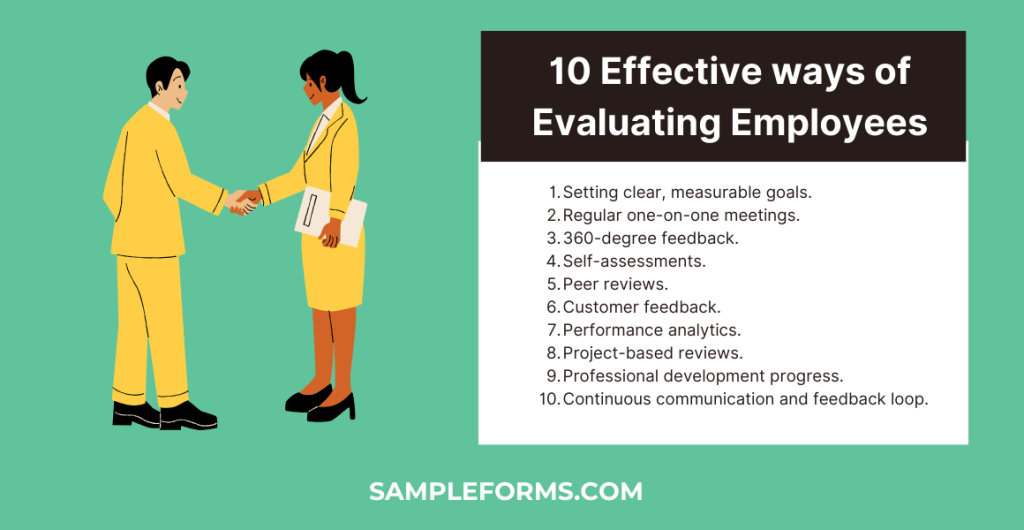
- Setting clear, measurable goals.
- Regular one-on-one meetings.
- 360-degree feedback.
- Self-assessments.
- Peer reviews.
- Customer feedback.
- Performance analytics.
- Project-based reviews.
- Professional development progress.
- Continuous communication and feedback loop.
What are the Benefits of Using Evaluation Forms?
- Comprise of important parameters which are crucial while evaluating a person, service or property
- Easier to fill in
- Makes it easier for the evaluator to jot down all the details in an organized manner
- Can be filed for future references
Evaluation forms can be extremely beneficial in making important assessments in your daily course of work. However, if you are not sure how to design these, don’t worry. Check out our vast collection of evaluation forms online. These are easy to download and are available for all purposes. The best thing about these forms is that you can customize these to suit your requirements.
What is Post Evaluation Form?
A Post Evaluation Form is a tool used to gather feedback and assess the effectiveness of an event, project, course, or training session after its completion. It typically includes questions or statements that allow participants to rate various aspects such as content quality, organization, presentation, relevance, and overall satisfaction. The purpose of this form is to collect insights from attendees or participants on what worked well and what could be improved. This feedback is crucial for organizers, trainers, or educators to understand the impact of their work and to make informed adjustments for future improvements.
How do I create an Online Evaluation Form?
Creating an Online Evaluation Form involves several steps to ensure it’s effective and user-friendly. Here’s a guide:
1. Define the Purpose:
Clearly understand what you want to evaluate (e.g., a course, event, service) and what information you need.
2. Choose a Platform:
Select an online form builder like Google Forms, SurveyMonkey, or Typeform. These platforms offer templates and customization options.
- 3. Design the Form:
- Layout: Choose a clean, easy-to-navigate design.
- Questions: Draft clear, concise questions. Mix question types (multiple choice, rating scales, open-ended) for comprehensive feedback.
- Rating Scales: Use uniform scales (e.g., 1-5 or 1-10) for consistency.
- 4. Include Essential Sections:
- Introduction: Briefly explain the purpose of the evaluation and how the data will be used.
- Feedback Questions: Cover all key areas like content quality, presenter effectiveness, overall satisfaction.
- Open-Ended Questions: Allow for additional comments or suggestions.
- Test the Form: Before launching, test the form for user experience, question clarity, and technical issues.
- Distribute the Form: Share the form with participants via email, social media, or embedded on a website.
- Collect Responses: Set a deadline for responses to ensure timely feedback.
- Analyze the Data: After collection, analyze the responses to gain insights and identify areas for improvement.
- Follow-Up: Consider sharing the outcomes or changes made based on the feedback with the participants.
Remember, the key to an effective online evaluation form is making it easy to complete while ensuring it gathers all the necessary information. Our Course Evaluation Forms is also worth a look at
What is Performance Evaluation Form?
A Performance Evaluation Form is a document used by organizations to assess an employee’s job performance over a specific period. It typically includes criteria such as work quality, productivity, skills, teamwork, punctuality, and adherence to company policies. The form may have a mix of rating scales, open-ended questions, and specific performance goals. It serves as a structured way for managers to provide constructive feedback, recognize achievements, and identify areas for improvement. Performance evaluations are crucial for career development, compensation decisions, and aligning individual performance with organizational goals.
Why do we need an Evaluation Form?
An evaluation form is needed for several key reasons:
- Feedback and Improvement: It provides structured feedback, helping individuals or organizations understand strengths and areas for improvement.
- Performance Tracking: In a workplace or educational setting, it tracks performance and progress over time.
- Decision Making: It aids in making informed decisions, like promotions, salary increments, or course adjustments.
- Goal Alignment: Helps align individual or team performance with organizational or educational goals.
- Recognition and Motivation: Recognizes achievements and motivates individuals towards continuous improvement.
- Documentation: Serves as a formal record of performance or feedback, useful for future reference.
- Communication: Facilitates open communication between evaluators and those being evaluated, promoting transparency and understanding.
Overall, evaluation forms are essential tools for growth, development, and effective management.
What is the Importance of Evaluation Form in Business?
In business, evaluation forms are crucial for assessing employee performance, guiding professional development, and informing management decisions for organizational growth and efficiency.
How do I Make My Own Evaluation Form?
To create an Evaluation Form, focus on your objective, whether it’s for assessing sales through a Sales Evaluation Form or gauging workshop effectiveness with a Workshop Evaluation Form. Ensure it’s structured, clear, and tailored to gather specific feedback.
How do you write a Performance Evaluation Form?
Writing a Performance Evaluation Form, like a Driver Evaluation Form or a Sensory Evaluation Form, requires setting clear, measurable criteria for assessment. Include sections for feedback and ratings to comprehensively evaluate performance aspects.
What is the most Common form for Employee Evaluation?
The most common forms for Employee Evaluation are the Mentor Evaluation Form and the Teacher Evaluation Form. These focus on developmental feedback, highlighting strengths and areas for improvement in a supportive manner.
What is a Good Evaluation Form?
A good Evaluation Form, such as a Seminar Evaluation Form or a Trainee Evaluation Form, is clear, concise, and targeted. It should solicit specific feedback that can be acted upon to improve future seminars or training programs.
What is the simplest form of Job Evaluation?
The simplest form of Job Evaluation combines an Activity Evaluation Form with a Performance Evaluation Form. It assesses job tasks and performance straightforwardly, focusing on essential criteria for a comprehensive evaluation.
Evaluation Forms play a pivotal role in continuous improvement and personal development. By incorporating samples, forms, and letters, this guide emphasizes the significance of structured feedback mechanisms. Among these, the Self Evaluation Form stands out as a powerful tool for fostering self-awareness and personal growth, enabling individuals to reflect on their achievements and areas for improvement in a structured manner.
Related Posts
-
FREE 6+ Business Credit Checklist Forms in PDF
-
Employee Pay Increase Form
-
Chef Evaluation Form
-
FREE 8+ Kitchen Evaluation Forms in PDF | MS Word
-
Customer Service Evaluation Form
-
FREE 15+ Grant Evaluation Forms in PDF | MS Word
-
FREE 14+ Volunteer Evaluation Forms in PDF
-
Mentee Evaluation Form
-
Speaker Evaluation Form
-
FREE 14+ Vehicle Evaluation Forms in PDF
-
FREE 14+ Trainee Evaluation Forms in MS Word | PDF
-
Resume Evaluation Form
-
FREE 14+ Retreat Evaluation Forms in PDF
-
Debate Evaluation Form
-
FREE 14+ Book Evaluation Forms in PDF | MS Word
